- Home
- MACC Japanese Lessons
- MACC Japanese Lessons - Example
Japanese Programs by Levels
Survival Japanese
(a) Kansai Survival (b) Tokyo Surviva
Participants with or without little previous knowledge of the language can start with Survival Japanese. Each session offers basic communication skills and knowledge of the language and culture which are essential to live and work in Japan.
Kansai / Tokyo Survival
| 1. Introduction, Greetings, Numbers | 2. Ordering a Meal (Restaurants) | 3. Buying Things (Shops, Supermarkets) |
|---|---|---|
| Self-Introduction | Foods & Table Manners | What to look for |
 |
 |
 |
| 4. Using Transportation (Stations, Taxis) |
5. Delivery Services (Pizza, Cleaning) |
6. Asking the Way (Directions) |
| Route Maps, Where to go | Various Services | Where to find things |
 |
 |
 |
Practical Japanese
(a) Beginners Course
The trainee will be able to hold daily conversations, using simple, and a few complex, sentences. He/she will be able to interact with people in various public services, and make himself/herself adequately understood when expressing his/her daily needs. He/she will be able to read and write short sentences to be used on social and business occasions.
(b) Intermediate Course
The trainee will be able to conduct routine business dialogs in day-to-day situations as well as daily and social conversations, using fairly long sentences. He/she will also be able to interact with various service people by giving detailed descriptions, and give opinions or comments at business meetings. He/she will also be able to read and write straightforward business correspondence.
(c) Advanced Course
The trainee will be able to conduct general business discussions and simple negotiations, and be capable of making a formal or informal speech or presentation at business and social gatherings. He/she will also be able to understand TV programs in order to obtain information, and read newspapers, typical business correspondence, books and periodicals with the help of a dictionary. The trainee will be able to write fairly long business documents.
Japanese for Specific Purposes
(a) Business Japanese
Typical Functions to be Covered: 300-hour Course (Sample)
- Can make a presentation to project team members on revised strategies
- Can make a presentation via a video conference to project team members at home and abroad on pricing and volume forecasts
- Can discuss at an inter-departmental meeting, a consumer research plan to identify possible latent consumers needs
- Can exchange opinions and views with relevant departments on possible new products and projects
- Can conduct interviews with business partners for the purpose of improving the existing system
- Can make a proposal to management and relevant departments on plans for a new promotion program
- Can analyze the sales plan of a specific big consumer and competitors' current business plans
- Can formulate a plan and strategies to minimize the total volume of inventories in the supply chain
- Can study the effectiveness and advantages of advanced use of consumers' database
- Can prepare a written memo to relevant departments concerning the presenter's proposed total review of product concept
- Can design a questionnaire to conduct a monitors' research through the internet
(b) Japanese for Diplomats
Typical Functions to be Covered: 50-hour Course (Sample)
- Can make a speech or presentation on formal occasions
- Can take part in a press interview
- Can interact with people in and outside the office by using appropriate levels of honorifics or informal speech
- Can cope with emergencies, claims and problems
- Can obtain the latest detailed information from newspapers, magazines, TV/radio programs, Internet and other publications and sources in Japanese
- Can talk and read about Japanese politics, economy, social affairs, culture, and history to get familiarized with Japanese way of thinking
- Can explain politics, economy, social affairs, culture, history, etc. of your own country, and compare them in clear terms with those of Japan
- Can prepare for the Language Examinations for Diplomats
(c) Japanese for Financial Analysts
Typical Situations to be covered: 80-hour Course (Sample)
- Morning internal briefing session
(Role Play: Mr. John Smith, a research analyst of New Rich Capital Markets K.K. in Tokyo, is presenting at an inter-departmental, morning briefing session, his views on upgrading the investment rating of PONY Corporation. PONY is a manufacturer and marketer specializing in information, telecommunication and audio-visual equipment.) - Visiting a company
(Role Play: Mr. John Smith visits Kadomatsu Corporation, an Internet venture company, and interviews Mr. Saburo Suzuki, the company's CEO.) - Giving a lecture at a seminar
(Role Play: Mr. Yuri Smirnov, economist of New Rich Capital Markets K.K., lectures at an investment seminar for institutional clients on Japanese economic outlook.)
(d) Japanese for Housekeeping
Typical Functions to be covered: 80-hour Course (Sample)
- Can pay bills
- Can interact with the service people at a bank, post office, ward office, police station, beauty salon, dry cleaner's, sports club, car dealer, gas station, etc.
- Can cope with emergencies
- Can explain symptoms to a doctor and understand prescriptions
- Can have things repaired; computer, electricity, gas, water supply, electric appliances, telephone, car, shoes, etc.
- Can have things properly done by a home helper, baby-sitter and gardener
- Can confirm schedule with various people concerned
- Can talk to a school teacher, other parents, piano teacher, janitor, landlord, etc.
- Can understand notices and obtain necessary information
- Can talk to the neighbors and get information about garbage collection, community activities, etc.
- Can ask for a delivery service
- Can answer the phone
- Can bargain at a bazaar, temple sale, etc.
- Can ask for the exchange of goods or refunds
- Can complain noises
- Can understand the foodstuff, ingredients, expiry dates, recipes, etc.
(e) Japanese for Children
The course is designed to make each lesson enjoyable and exciting in order to maintain the trainees' motivation. The instructors are not only qualified to teach Japanese to children, but they love sharing a variety of activities including singing songs and playing games with them in the class. Also, older children can benefit from our instructors’ professional teaching to improve their school grades and prepare for the International Baccalaureate Examination. MACC has Standard Levels and Tests for young people. Professional advice is offered and a report is provided at agreed intervals during the course to constantly monitor the trainees' progress and improve their ability. A certificate is issued for the trainees at the end of each stage of the learning level.
Typical Reasons of Enrollment
- To review what the trainees have learned at school
- To improve a particular area of study such as grammar, vocabulary, Kanji, conversation, etc.
- To carry out home-teaching
- To enjoy and be comfortable within the Japanese environment
- To prepare for the International Baccalaureate Examination
(f) Preparatory Course for the Japanese Language Proficiency Test (JLPT)
MACC has specially designed and developed courses for each level of the Proficiency Tests. The Test consists of three parts of Kanji & Vocabulary, Listening Comprehension and Reading & Grammar. Past papers and textbooks with related questions and MACC handouts are used throughout this course. MACC also organizes and provides the original mock tests that have the same format and similar contents as those of the Test itself. The course concentrates on the anticipated questions and consolidates each point necessary for passing the Test. The pass rate is generally much higher than that of the average figure that the Examination Agency publicizes.
(g) Preparatory Course for BJT Business Japanese Proficiency Test
MACC offers the preparatory course for BJT Business Japanese Proficiency Test, whose aim is to measure the examinee’s communicative proficiency in business Japanese. The Test consists of three parts of “Listening Comprehension,” “Listening & Reading Comprehension” & “Reading Comprehension.” The course is mainly focused on knowledge of Japanese grammar, business-related vocabulary and expressions, kanji, reading typical formats in various business situations as well as information on Japanese way of thinking in business situations. MACC frequently provides practices on anticipated questions, and consolidates each point essential to obtain high scores in the Test.
(h) Speech, Presentation and Discussion
MACC designs and offers Japanese courses particularly focusing on the effective ways to make speeches and presentations, and lead discussions. The trainee is exposed to different styles and tones of speeches by listening to various people. He/she can provide his/her business meeting situations and documents that are to be used to produce handouts and speaking practice. These materials are treated as strictly confidential and are restricted to in-class use only.
(i) Kanji Reading and Writing
MACC offers Reading & Writing sessions at all levels of Japanese language proficiency. The trainee can particularly receive the benefits of an expanded vocabulary and improved reading comprehension and its speed. Beginners are introduced to how to consult a Kanji dictionary, and advanced trainees aim at reading newspapers, various business documents and handwritten personal letters without the help of a dictionary. The materials can be chosen according to the trainee's needs.
Other Japanese Programs
(a) Intensive Course
| One-Month Intensive Course Schedule (Sample) (120 hours: 6 hours daily x 5 days weekly x 4 weeks) |
||
|---|---|---|
| Sessions | Time | Contents |
| Session 1 | 9:00 - 10:30 | Vocabulary Building & Structures |
| Break | 10:30 - 10:40 | |
| Session 2 | 10:40 - 12:10 | Oral Drills |
| Lunch time | 12:10 - 13:30 | Self-Study |
| Session 3 | 13:30 - 14:30 | Situational Dialogs & Role Play |
| Break | 14:30 - 14:40 | |
| Session 4 | 14:40 - 15:40 | Reading & Writing |
| Break | 15:40 - 15:50 | |
| Session 5 | 15:50 - 16:50 | Review & Quiz of the Day |
| Homework | ||
(b) Group Lesson
We can form a group of the participants at the same proficiency level who have the common targets. Each trainee is required to maintain an attendance rate of over 80% to keep up with the class level.
| Group Lesson (Sample) | |||
|---|---|---|---|
| Format | Trainees | Level | Objective |
| Intensive Group Lesson | Business people | Intermediate | To acquire communication skills used in business situations, especially to speak to their Japanese managers, colleagues, clients and suppliers |
| Regular Group Lesson | Business people | Intermediate | To improve oral communication skills to cope with social and business situations on their own |
| Regular Group Lesson | Researchers | Beginners | To develop fundamental skills necessary to use in their social and business situations |
| Regular Group Lesson | Company trainees | Beginners / Intermediate | To prepare for J-Test and /or the Japanese Language Proficiency Test |
| Irregular Group Lesson | Spouses | Beginners / Intermediate | To enhance their fluency needed for daily communication |
(c) Japanese Conversation Class
This course aims at improving oral and aural skills utilizing group activities such as role playing, topic discussion, simulation games, etc. The sessions are formed with more than three participants in each category from Beginners to the Intermediate Level. At Beginners Level, daily situations are covered using role playing, while at Intermediate Level, various familiar topics are discussed to exchange opinions.
(d) Homestay Program
MACC offers a Homestay Program usually combined with an Intensive Course. Trainees are totally immersed in the language learning, which results in quicker progress and better understanding of the Japanese way of thinking.
(e) Association Program (Kana)
MACC KANA ASSOCIATION SESSION
かな カナ かな カナ
あいう アイウ
Learn Hiragana and Katakana in 90 minutes!
MACC uses the amazing 'Association Method' for Kana (Japanese letters) learning. A picture is used for each Kana along with an English clue, which enables the participants to recognize Kana in an incredibly short time. A program with French clues is also available.
(f) Association Program (Kanji)
MACC KANJI ASSOCIATION SESSION
かんじ 漢字 かんじ
月 山 水
Recognize 50 Survival Kanji in just 90 minutes!
MACC has produced an amazing new 'Association Method' for Kanji (Chinese character) learning. A picture is used for each Kanji with an English clue, which enables the participants to recognize and enjoy understanding the meaning of Kanji in an incredibly short time. They are also introduced to the basic ideas of how Kanji are formed.
(g) Japanese Level Assessment by MACC Standard Test
MACC has 10 Levels from Beginners I to Superior Level. A trainee's level assessment will place him/her in an appropriate level. These levels are useful for gauging communication skills, reading comprehension, grammar, etc.
Cultural Programs
(a) Japanese Culture Orientation
The course is best suited to the requirements of businesspeople and their spouses who have newly arrived in Japan. In a short span of the training time (2-6 hours), the participants are introduced to the useful cultural information and a few survival Japanese words indispensable to comfortably start their social and business life here.
Half-Day Orientation (Sample)
| Session | Contents | |
|---|---|---|
| S.1 | Japanese Culture  |
Japanese Culture & Cultural Gap
|
| S.2 | Selected Real-Life Japanese (90 min) |
|
| S.3 | Field Trip  |
- Using Japanese to interact with people outside - Survival Kanji |
(b) Cross-Cultural Communication Program
MACC runs cross-cultural communication programs for the participants who wish to acquire the necessary information about Japanese culture and the Japanese way of thinking in order to experience a comfortable life in Japan and successfully conduct business with Japanese people.
Sample Plan
| Contents | |
|---|---|
| Session1 (2.0 hrs) | Formation of Japanese Culture & Typical Behavior ・Geographical, Historical & Religious Background ・Japanese Way of Thinking ・Typical Behavior ・Business Customs ・Case Studies |
| Break | |
| Session2 (1.0 hr) | Cultural Gap & Cross-Cultural Communication ・Japanese Calendar ・Japanese Ceremonies ・Do's & Don'ts ・Manners & Etiquette ・Culture Expressed in the Language |
(c) Cultural Events
MACC organizes some cultural events every year for the trainees. To stimulate their motivation, the events contain a variety of programs such as speech contests, demonstrations of flower arrangement, calligraphy, Karate, and a tea ceremony session. These provide the trainees with experience of Japanese culture and way of thinking, offering them a deeper understanding of living, working and communicating in Japanese society, and accelerating their rate of learning. Furthermore, the trainees can enjoy the opportunity to meet with other trainees, not only from their own company, but from other organizations, and to use their Japanese to interact with people from different countries.
-
New Year Party
(SHIN-NEN-KAI)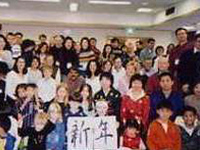
Everybody had a good time, talking to different people in Japanese and celebrating the year ahead.
-
'Sakura'(Cherry Blossom) Festival

Every participant wore pink in appreciation of the color of the blossom.
-
Tea Ceremony
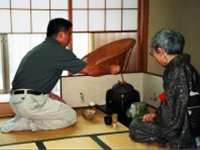
Experience Japanese culture such as tea, flowers, and calligraphy.
-
Field Trip
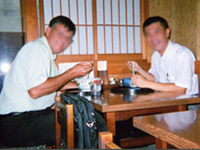
Trainees can be accompanied by a MACC instructor to go to Kyoto, Nara or Kamakura to experience the 'old Japan'. Also they can go to a nearby shop or restaurant to carry out assignments in Japanese.
Visiting Sake Breweries in Kobe
-

Sake brewery entrance
-
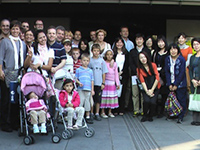
Participants learned a traditional sake brewing process.
-

Participants also enjoyed sake tasting.
-
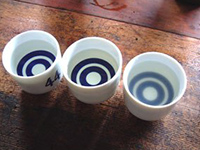
Guinomi (small sake cup) for tasting
Gaikokujin nimo wakari yasuku setsumei sareta node honto ni tanoshimeta. Toku ni nenpai no kata no shosa ga, kantan so ni miete jitsu wa 30-nen no keiken ni urauchi sareta mono da to shitte, odoroita.
My wife and I greatly enjoyed attending the tea ceremony with the MACC instructor. It was a wonderful cultural experience. Having the MACC instructor there made it much easier for us to understand and appreciate the nuances and the beauty of the tea ceremony.
たいへん おもしろかったです。
Great! Yokatta. Arigato Gozaimashita.
Sake tour was nice. Informative and enjoyable. Also met some new people.
My husband and I really enjoyed the sake tours. We would be happy to participate in other similar events. Thank you for organizing the event.
Distance Learning
(a) MACC Online Japanese Lesson
MVC(MACC Virtual Classroom) provides real time, interactive Japanese language lessons with 'real' MACC instructors over the Internet, using voices and visual communications. It facilitates participants either in taking lessons outside of Japan or in making up pre-scheduled lessons that had to be canceled.
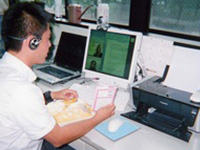
Participants who would benefit from MACC Online Japanese Lesson
- Transferees and their spouses who prefer to start taking lessons prior to their arrival in Japan
- Trainees who wish to take lessons while they are away from Japan for business trips or on annual home leaves overseas
- Participants who want to quickly make up selected lessons, as they had to cancel some of their pre-scheduled classes
- Students who prefer online lessons
(b) Japanese Correspondence Course
MACC offers Japanese Correspondence Courses at all levels to the trainees who are outside of Japan or those who cannot take face-to-face lessons. Trainees are provided a set of previously agreed assignments to be returned to MACC by post or email for checking and marking. Detailed comments are provided with suggested areas for improvement.

(c) Self-Paced E-Learning
MACC offers practical stand-alone E-Learning suited to various requirements such as business/daily needs or preparation for JLPT (Japanese Language Proficiency Test) at all levels from Survival to the Advanced. The programs can be viewed with a PC, smartphone or tablet.





